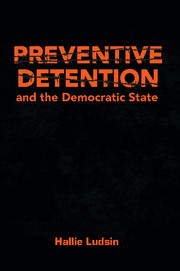Book contents
- Frontmatter
- Contents
- Acknowledgements
- List of Acronyms and Abbreviations
- Introduction
- 1 The Theoretical Framework
- 2 The Policy Debates
- 3 Preventive Detention under International Law
- 4 The History of Preventive Detention in India
- 5 India's Current Preventive Detention Legislation
- 6 India: Preventive Detention and Due Process
- 7 India: The Risk Society and the Slippery Slope
- 8 Preventive Detention in England
- 9 England: Preventive Detention and Due Process
- 10 Preventive Detention in the United States
- 11 The United States: Preventive Detention and Procedural Due Process
- 12 Preventive Detention's Slippery Slope
- 13 Preventive Detention and Liberal Democracy
- Index
6 - India: Preventive Detention and Due Process
Published online by Cambridge University Press: 05 March 2016
- Frontmatter
- Contents
- Acknowledgements
- List of Acronyms and Abbreviations
- Introduction
- 1 The Theoretical Framework
- 2 The Policy Debates
- 3 Preventive Detention under International Law
- 4 The History of Preventive Detention in India
- 5 India's Current Preventive Detention Legislation
- 6 India: Preventive Detention and Due Process
- 7 India: The Risk Society and the Slippery Slope
- 8 Preventive Detention in England
- 9 England: Preventive Detention and Due Process
- 10 Preventive Detention in the United States
- 11 The United States: Preventive Detention and Procedural Due Process
- 12 Preventive Detention's Slippery Slope
- 13 Preventive Detention and Liberal Democracy
- Index
Summary
Chapter 6 examines how India responds to each of the five policy issues described in Chapter 2. It discusses the types of threats India believes necessitate preventive detention. It examines the jurisdictional questions of how the government identifies detainees, who is entitled to order detention and whether civil or criminal law govern the order. It then considers the extent to which India protects due process rights, specifically considering the rights to judicial review, information and an attorney as well as the burden of proof that applies to the order. The chapter also questions whether India allows for indefinite detention. Lastly, the chapter describes any other rights protections India offers detainees. Because there are only minor differences between the pieces of preventive detention legislation, other than the types of crimes sought to be prevented, the discussion tackles the policy issues collectively.
Many of India's 28 states also have preventive detention legislation that allows them to order detention without central government oversight. This book restricts its examination of preventive detention to the national level because the copious amount of preventive detention legislation makes it unfeasible to examine both state and national legislation. Such an examination is also unnecessary since the collective impact of broad preventive detention powers on India's democracy is the same with or without an in-depth analysis of state legislation.
Chapter 6 shows both the breadth of targets for preventive detention and the meagreness of the constitutional minimum of safeguards guaranteed to detainees in India. It ultimately paints a picture of a government with remarkable freedom to order preventive detention against nearly any type of criminal. It reveals that India is comfortable substituting preventive detention for prosecution to ensure no dangerous persons will be set free, even at the risk of detaining innocent people. Together, the breadth of India's preventive detention legislation and the minimal safeguards demonstrate what the bottom of the preventive detention slippery slope looks like in a democratic country.
Sources of law
The primary sources of Indian law are the Constitution, statutory law and case law. India is a signatory to the International Covenant on Civil and Political Rights, which means it is also governed by international human rights law. It has however, placed a reservation on Article 9's right to liberty stating that it applies only to the extent it conforms to India's Constitution.
- Type
- Chapter
- Information
- Preventive Detention and the Democratic State , pp. 154 - 194Publisher: Cambridge University PressPrint publication year: 2016

